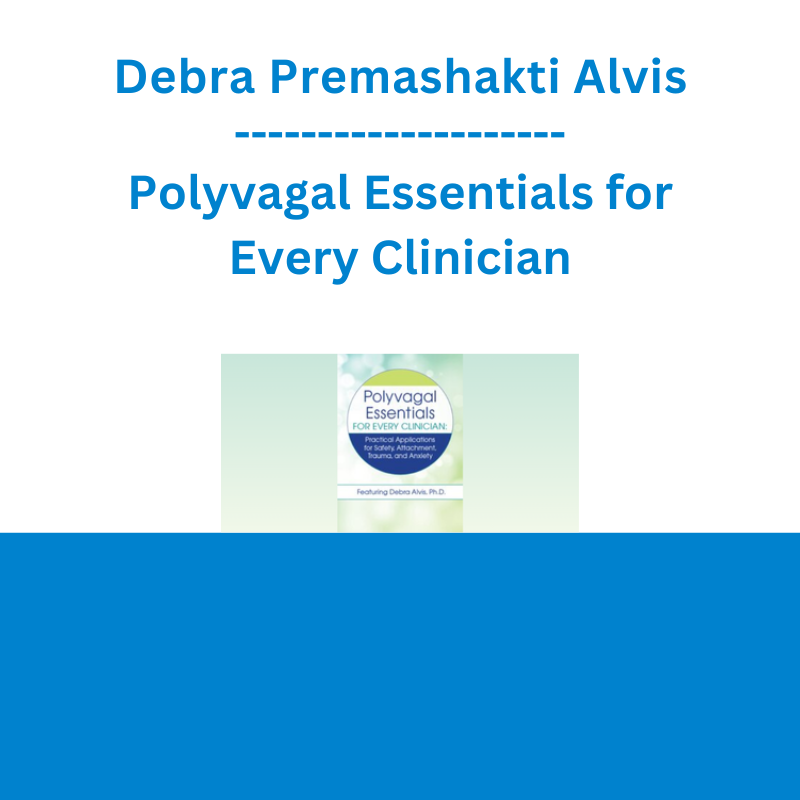*** Proof of Product ***
Exploring the Essential Features of “Debra Premashakti Alvis – Polyvagal Essentials for Every Clinician: Practical Applications for Safety, Attachment, Trauma, and Anxiety”
Speaker: Debra Premashakti Alvis, PhD
Duration: 6 Hours 17 Minutes
Format: Audio and Video
Copyright: Nov 08, 2023
Media Type: Digital Seminar
Description
Many of our clients struggle to find and maintain the safety needed to face the risks and the wonder inherent in living.
The Polyvagal Theory has been termed the science of safety. This safety allows us to regulate our emotions, process our trauma memories, and engage with others successfully.
This work gives us a psychological and physiological understanding of our shifts through mobilization, disconnection, and engagement. Dr. Stephen Porges’ evidenced perspective shapes new approaches to trauma treatment, relational concerns, and mood disorders.
Dr. Debra Alvis will give you the science and theory in easy to understand language…and in an applied manner. End the training knowing how to map the autonomic response and how to repattern the autonomic nervous system for safety.
Experiential exercises and worksheets provided in the live webcast will guide you in the application of polyvagal knowledge to clinical work.
Watch Debra for this exciting day of theory, research, and application. A well-seasoned and national presenter, she brings an extensive background in neuroscience, the experience of a twenty-five-year clinical practice, and a love of whole-person treatment approaches to the training.
Enjoy anecdotes, take in clinical scenarios designed to clarify application principles, and practice interventions with Debra’s expert guidance. Return to your practice with:
- New, evidence-based approaches to replace clients’ maladaptive protective patterns
- Ways to enhance your clients’ capacity to connect to the self and others
- A transformational understanding of the autonomic nervous system to promote healing from trauma wounds
Speaker
Debra Premashakti Alvis, PhD
Debra Premashakti Alvis, PhD, is a licensed psychologist and private practitioner with over 25 years of clinical experience in supporting clients’ recovery from shame, trauma, anxiety, depression and relational concerns. A seasoned international presenter and consultant, Dr. Alvis is a therapeutic yoga educator and retired as faculty from the University of Georgia where she developed and led the Mind/Body Program. The program included a clinician training program integrating contemplative approaches in psychotherapy. A thirty-five-year personal contemplative practice, research experience, and a deep understanding of applied neuroscience, Polyvagal Theory, and compassion resiliency further enrich her presentations. She draws upon this unique background to provide effective and easily applicable skills designed for immediate integration into clinician’s practices.
Speaker Disclosures:
Financial: Debra Alvis maintains a private practice and has employment relationships with the University of Georgia, PSIvet, Mountain Area Health Education Center, Twin Lakes Recovery Center, and Ridgeview Institute. She receives a speaking honorarium and recording royalties from PESI, Inc. She has no relevant financial relationships with ineligible organizations.
Non-financial: Debra Alvis has no relevant non-financial relationships.
Objectives
- Analyze how the Polyvagal Theory expands therapeutic knowledge and treatment concerning trauma, anxiety, depression, and social engagement disorders.
- Compose everyday language to better explain the Polyvagal Theory, helping clients understand their symptoms and increase their motivation.
- Assess client states of threat, risk, and safety and identify effective polyvagal interventions.
- Integrate therapist co-regulation tools designed build the client’s self-regulation capacities.
- Apply interventions to enhance self-regulation, support internal calm, increase feelings of safety, and increase social engagement.
- Utilize awareness-based approaches to strengthen resiliency.
- Employ contemplative practices that strengthen the clients’ capacity to shift their nervous system to better manage physiologic responses.
Outline
The Polyvagal Theory & How It Drives Behaviors
- The biology of safety and danger
- Evolutionary changes and adaptive functions
- Social engagement, fight/flight, and shutdown
- The human response hierarchy for challenges
- Face-heart connection – the how and why of nervous system regulation
- Gestures, vocalizations, facial expressions
- Polyvagal theory risks and limitations in clinical practice
Building Skills to Assess & Increase Safety
- Recognize how environments trigger physiological states
- Identify adaptive physiological reactions and maladaptive behaviors
- Build greater nervous systems flexibility:
- Play as a neural exercise
- Listening as a neural exercise
- Attending to visceral feelings and social cues
Strengthen Self-Regulation Skills
- Increase autonomic state awareness to strengthen emotional regulation
- Map vagal states with writing, drawing, & mirroring
- Identify social cues that initiate defensive reactions
- Explore the regulation/dysregulation continuum
Establish Disorder-Specific Skills to Address Mood and Attachment
- Recognize & shift characteristic nervous system states for depression, anxiety, and attachment
- Soothe anxiety
- Navigate the sympathetic response
- Escape the tiger!
- Enliven from depression:
- Engage with awe, experience wonder
- Savor moments and states
- Repair attachment to self & others:
- Belongingness treasures
- Explore the face/heart connection
Negotiate Trauma Treatment – Explore Abuse and Neglect Responses
- Name defense strategies of fight, flight, and immobilization
- Highlight adaptive functions of immobilization, fight, & flight
- Label defense reaction behaviors
- Repattern social withdrawal & shutdown responses
Recognize Autonomic States & Strengthen Resiliency Through Contemplative Practice
- How contemplative practices enhance nervous system responses
- The five senses & the polyvagal system
- Build present moment & witnessing skills
- Autonomic meditations
- Gentle movements and interoceptive awareness
- Titrate movement into stillness
- Tone the vagal nerve with breath, sound, & imagery
Expedite Recovery, Increase Well-Being – The Polyvagal Therapeutic Container
- Co-regulate with the client
- Recognize, Reach, Resonate, Regulate
- Conclude the session with a return to social engagement
- Yawn and stretch
- Body calming
- Evoke safety through room & exterior design
Returning to Practice Integrating a Polyvagal Approach
- Establish relational reciprocity & repair skills
- Perfect Nurturer Imagery
- Syncing the breath
- Build relationships with self and others
- Self-compassion practices to fuel empathy
- Connection through compassion
Target Audience
- Counselors
- Social Workers
- Psychologists
- Case Managers
- Addiction Counselors
- Therapists
- Marriage & Family Therapists
- Nurses
- Psychiatrists
- Physicians
- Other Mental Health Professionals
Please see the full list of alternative group-buy courses available here: https://lunacourse.com/shop/










 Ed Ponsi - Forex Trading
Ed Ponsi - Forex Trading  Greg Gottfried - YouTube Affiliate Masterclass
Greg Gottfried - YouTube Affiliate Masterclass  Jesse Livermore Trading System - Joe Marwood
Jesse Livermore Trading System - Joe Marwood  Matthew Kratter - Trader University
Matthew Kratter - Trader University